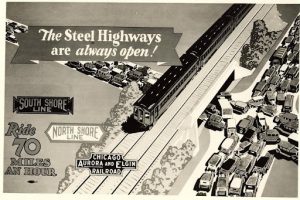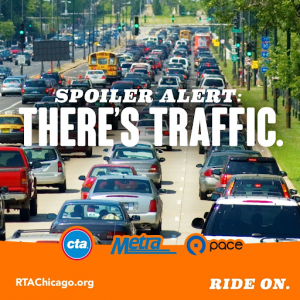New Jersey Future Blog
Logging On: Examining the Influence of NUMTOTs on Urbanism Discourse
September 19th, 2024 by Sneha Patel
“Whatever your niche interests are, there’s already a conversation happening online about it,” Michael Atkins, Communications Director at New Jersey Future, opened astutely when moderating the session “Logging On: Examining the Influence of NUMTOTs on Urbanism Discourse” at the 2024 New Jersey Planning and Redevelopment Conference hosted by the New Jersey Chapter of the American Planning Association and New Jersey Future.
From navigating confusing metro maps to voicing frustrations with the lack of bike lanes, younger generations are using their lived experiences to engage with peers through the online ecosystem. By creating and sharing memes, young people have found a collective vehicle to insert themselves into the planning and transportation conversation. Millennials and Gen Z’s in the urbanism space, who hold similar values such as being pro-transit and pro-housing and believe better urbanism is crucial to meeting environmental goals, are called NUMTOTs, otherwise known as New Urbanists Memes for Transit-Oriented Teens.
The session featured a selection of online creators with different insights, from the birth of “NUMTOTs” to creators of longer-form and short-form content. The panelists included Alan Fisher, Social Creator and Media Advisor; Alex Ambrose, Policy Analyst, New Jersey Policy Perspective; and Juliet Eldred, Co-Founder of the NUMTOT Facebook group and Project Manager at Trillium, an Optibus Company.
The NUMTOTs Facebook group, created in March 2017 by Juliet Eldred and her co-founder Emily Orenstein—initially created as a joke—has flourished into a well-established discussion forum with over 225,000 members worldwide. Facebook served as the primordial soup for the emergence of transit-related memes, where many groups based on niche topics were common. Memes are images or short videos that are usually funny or relatable and are easily circulated. They are a way of tapping into feelings that everyone shares, from missing the bus to seeing something as bizarre as a bull on the tracks of NJ Transit. The shareable, simple nature of memes makes them a driving force to connect multiple generations to rally behind issues areas (even going as far as winning presidential endorsement from the entire group). The NUMTOT Facebook group was where many young professionals fostered their interest in the transit and planning field.

Alan Fisher, a fellow NUMTOT himself, explains how everyone engages in meme culture in some form: “The learning experience or the way that you teach the public has changed, but the concepts and the ways that we talk about it have not.” He compares a 1930’s advertisement from the Chicago Shore Line, which states, “The Steel Highways are always open!” to a current ad from the Chicago RTA, “Spoiler Alert: There’s Traffic.” Close to 90 years later, the same message remains: take the train, and you won’t be stuck in traffic. Fisher, the creator of the YouTube series Armchair Urbanist, on a YouTube channel with 225K subscribers and 24.5M views, makes content focused on urban planning, transportation, and North American history. He comments, “There’s always something to teach about urban planning to the general public. You have to shape and create a message in a way people will understand.” His YouTube community has been a place to get people engaged in otherwise “dull” topics and for professionals to get excited to talk about their niche interests in a captivating way. Being relatable, clear, and oftentimes funny can be the key to crafting content that resonates with people. Organizations frequently struggle with being too business-focused and using “LinkedIn fluff.” as Alan puts it. He remarks, “Being too nice at approaching concepts or too scared at making fun of the industry can keep you from connecting with anyone, leaving you with too muddy of a message because you aren’t taking a stand on anything.”


Alex Ambrose, Policy Analyst at New Jersey Policy Perspective, isn’t afraid of voicing their opinions. “You never know what will resonate with people,” Ambrose comments. Taking on the persona of a “Professional Nerd” she engages audiences on New Jersey policy primarily on Twitter and TikTok. Ambrose creates short-form content such as one-minute videos or shareable memes where she explains the legislative budget process while getting ready or inserting her policy opinions into trending topics like Barbie or Taylor Swift. She explains, “Humor creates a low barrier for people to understand new concepts.” Social media is unserious in nature but can have a tangible impact. She says, “You should treat social media like it is real life to reach your goals.” Social media content can reach influential audiences, including policymakers, senators, and even Governors. Ambrose aims to create content that reaches a specific audience to advocate for change. She advises, “Don’t go viral, go local.”

Social media may seem silly, but it is an effective means of intergenerational communication. Connecting our everyday occurrences and getting younger people interested, engaged, and informed is a way of leveling the playing field for those who want change but are unsure how to advocate for it. For many organizations, it can be a direct way to tailor your message to your audience. Access to affordable housing, multiple modes of transit, and clean drinking water are human issues. Everyone can relate and memes can be a way to mobilize the public. A little bit of “unprofessionalism” can make significant changes.
Related Posts
 June 24, 2024 Municipal Leaders Claim Public Engagement is Largest Asset to Lead Replacement Efforts
June 24, 2024 Municipal Leaders Claim Public Engagement is Largest Asset to Lead Replacement Efforts June 24, 2024 Unlocking Opportunities: Securing Funding for Trail-Related Projects
June 24, 2024 Unlocking Opportunities: Securing Funding for Trail-Related Projects March 13, 2025 Designing Pedestrian-Friendly Spaces to Enhance Health and Accessibility for New Jersey’s Aging Population
March 13, 2025 Designing Pedestrian-Friendly Spaces to Enhance Health and Accessibility for New Jersey’s Aging Population July 30, 2024 Heat, Air Quality, and Hope: Community Research and Resilience in Elizabeth, NJ
July 30, 2024 Heat, Air Quality, and Hope: Community Research and Resilience in Elizabeth, NJ July 30, 2024 New Jersey Needs More Housing, and Municipalities are on the Front Lines
July 30, 2024 New Jersey Needs More Housing, and Municipalities are on the Front Lines
Posted in New Jersey Future Blog, Transportation
Tags: 2024 NJ Planning and Redevelopment Conference, changemakers, communication, engaging audiences, influencing, issue awareness, New Jersey planning and redevelopment conference, NUMTOT, social media, Transportation, urbanism
Comments are closed.











